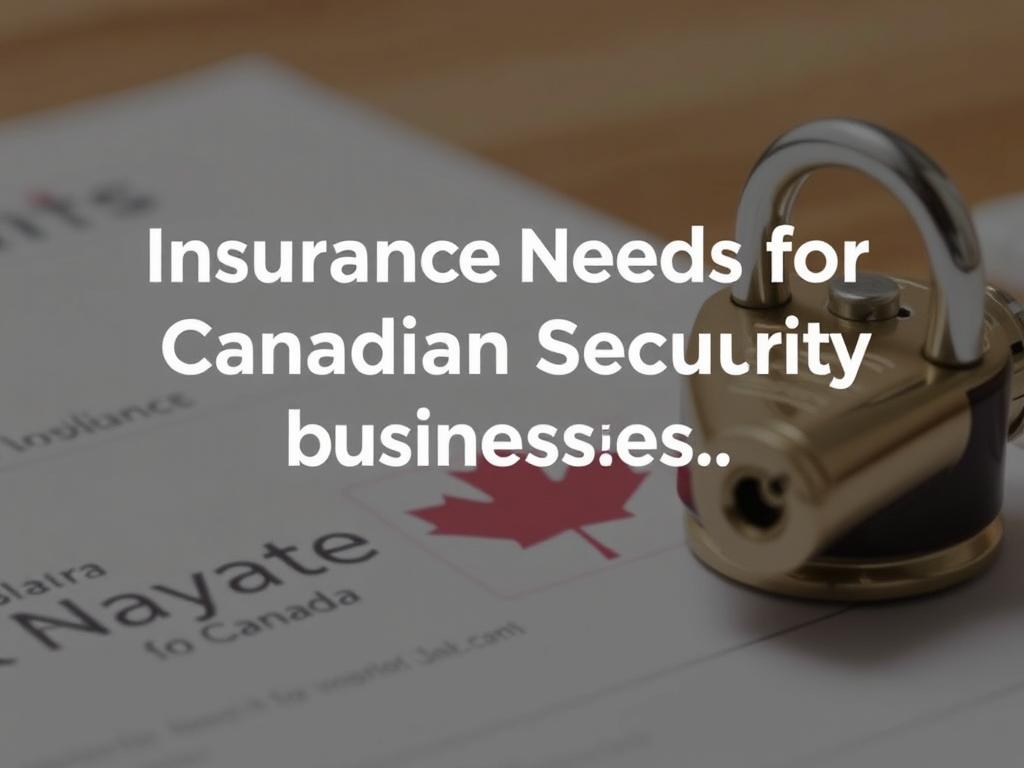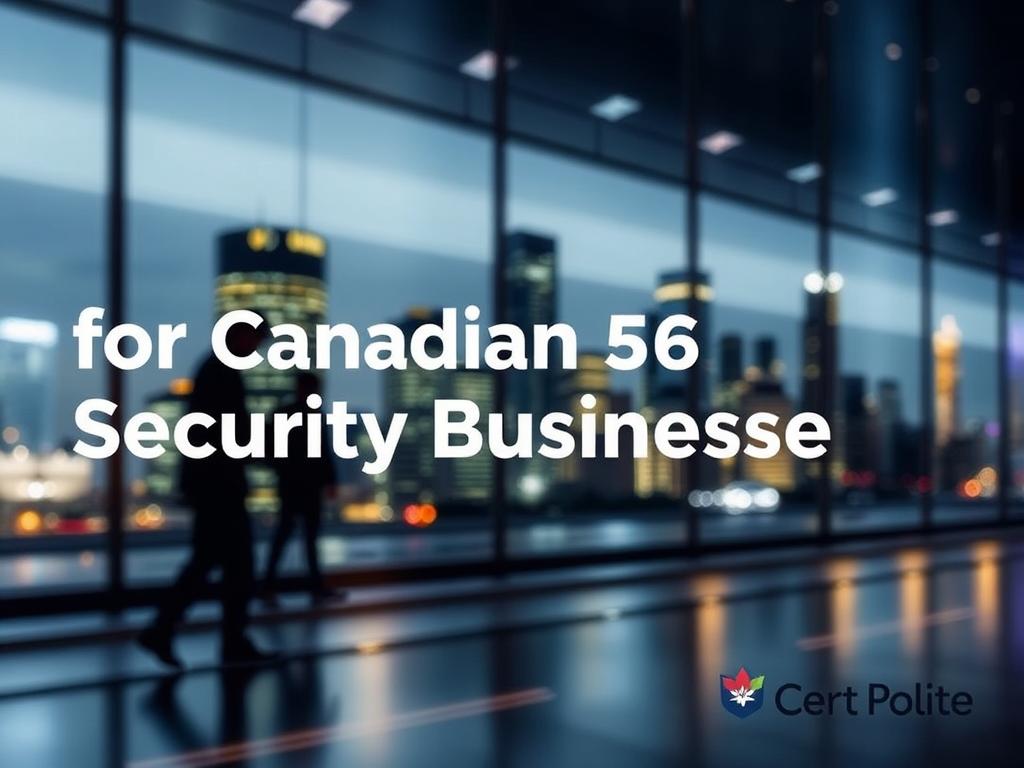Understanding the Unique Risks Facing Canadian Security Businesses
Running a security business in Canada comes with its own set of challenges and risks. Whether you offer private security guard services, alarm monitoring, or specialized security consulting, the nature of your work exposes your company to liabilities that other businesses may not face. That’s why understanding the insurance needs for Canadian security businesses is absolutely crucial. Without proper insurance coverage, one small incident could cost your business thousands—or even millions—of dollars in legal fees and damages.
Security companies operate in a high-stakes environment, often dealing directly with people involved in sensitive or potentially dangerous situations. From protecting private property and people to managing access control and emergency responses, security professionals face uncertainties daily. This means that risks include not only property damage and personal injury but also potential claims related to negligence, wrongful acts, and more. Consequently, choosing the right insurance coverage is essential to safeguard your business assets and reputation.
The Core Insurance Policies Every Canadian Security Company Needs
When it comes to insurance policies tailored for Canadian security businesses, there are several key types you should consider. Each addresses different aspects of risk that your company may encounter.
Commercial General Liability Insurance
One of the most critical policies for any security business is commercial general liability insurance. This coverage protects your company from claims related to bodily injury, property damage, and personal injury occurring on your premises or as a result of your operations. For example, if a security guard accidentally causes property damage while on duty or if someone sues your business for injuries sustained during an incident you were managing, this insurance can cover legal costs and settlements.
Professional Liability Insurance (Errors & Omissions)
Security businesses often provide advisory and consultation services, such as risk assessments or security system designs. Professional liability insurance—also known as errors and omissions insurance—covers claims arising from negligence, mistakes, or failure to perform professional duties adequately. This is especially important if you’re involved in security consulting or electronic security system installations.
Workers’ Compensation Insurance
Security officers frequently work in environments where injuries are possible. Workers’ compensation insurance is mandatory in most Canadian provinces and territories. It ensures that your employees receive medical care and wage replacement if injured on the job, while also protecting your business from lawsuits related to workplace accidents.
Commercial Property Insurance
Whether your security company owns an office, warehouse, or equipment such as alarm systems and vehicles, commercial property insurance keeps your assets protected from damage due to fire, theft, vandalism, or natural disasters. Given the value of specialized equipment for security operations, this coverage is vital.
Cyber Liability Insurance
In today’s digital era, many Canadian security businesses are responsible for handling sensitive client data, including security codes, surveillance footage, and personal information. Cyber liability insurance protects against losses from data breaches, cyberattacks, or privacy violations. As cyber threats increase, this type of coverage is becoming indispensable.
Commercial Auto Insurance
If your security business operates patrol vehicles or transports equipment and personnel, specialized commercial auto insurance is necessary. Standard personal auto policies typically exclude business-related use, leaving your vehicles and drivers vulnerable.
Additional Insurance Considerations Specific to Canadian Security Businesses
Beyond these common policies, there are insurance options that cater specifically to the nature of security work in Canada. Each can provide extra layers of protection depending on your services and operational scale.
Surety Bonds and Fidelity Bonds
Surety bonds provide clients assurance that you will fulfill contractual obligations, such as guarding property or cash handling duties. Fidelity bonds offer protection against employee dishonesty or theft. Many security companies require these bonds to build trust with clients and comply with regulatory requirements.
Equipment Breakdown Insurance
Security businesses rely heavily on technology like surveillance cameras, alarm systems, and communication devices. Equipment breakdown insurance covers the repair or replacement costs if such equipment fails or is damaged unexpectedly.
Umbrella Insurance
An umbrella insurance policy offers extra liability coverage beyond limits of your existing policies. Considering the potentially high liabilities involving physical security services, an umbrella policy can be a valuable safety net for Canadian security businesses.
Regulatory and Licensing Requirements Influencing Insurance in Canada

The insurance needs for Canadian security businesses are also influenced by provincial regulations and licensing stipulations. Canada does not have a single nationwide licensing system for security providers; instead, each province and territory governs security businesses locally. These entities often require proof of insurance as a condition for licensing or renewal.
Provincial Licensing Overview
| Province/Territory | Regulatory Body | Typical Insurance Requirement |
|---|---|---|
| Ontario | Private Security and Investigative Services Branch | Minimum $2 million general liability |
| British Columbia | Security Programs Office, Ministry of Public Safety | Commercial general liability insurance required |
| Alberta | Alberta Ministry of Justice | Proof of insurance mandatory |
| Quebec | Bureau de la sécurité privée | Liability insurance required for licensees |
| Manitoba | Manitoba Public Insurance | Mandatory insurance coverage for security firms |
Understanding these requirements helps security business owners avoid fines, penalties, or license suspensions and ensures that their insurance aligns correctly with the law.
How to Assess Your Insurance Needs as a Security Business Owner
Assessing what kind of insurance your Canadian security business needs might sound complicated, but it can be simplified into a few strategic steps. Being methodical will ensure you don’t underinsure or pay for unnecessary coverage.
- Evaluate Your Risks: Identify the specific risks inherent in your operations—for example, physical confrontations, property damage, or cyber breaches.
- Consider the Size and Scope of Your Business: Larger businesses or those operating in higher-risk environments may require broader or higher-limit policies.
- Consult Legal and Insurance Experts: Find brokers and advisors who specialize in Canadian security business insurance to customize your coverage accordingly.
- Review Client Contracts: Many clients require security companies to carry certain kinds and amounts of insurance.
- Regularly Update Coverage: As your business grows or changes, your insurance needs will evolve. Schedule annual reviews.
Tips to Lower Your Insurance Costs Without Sacrificing Coverage
Insurance costs can be significant for security businesses, but there are ways to manage expenses wisely. Implementing a few key strategies can result in savings:
- Maintain a Strong Safety Program: Demonstrating that your security personnel are well-trained reduces the risk of accidents and claims, which insurers reward with lower premiums.
- Bundle Policies: Purchasing multiple policies from the same insurer sometimes leads to discounted rates.
- Increase Deductibles: Choosing higher deductibles can lower monthly premiums but ensure you have reserve funds to cover potential costs.
- Improve Record Keeping: Keeping detailed incident and maintenance records shows your commitment to minimizing risks.
- Shop Around: Regularly compare quotes from multiple insurers to find competitive rates.
Emerging Trends in Insurance for Canadian Security Businesses

The security landscape is rapidly evolving, and insurance products must keep pace. Technological advances, shifting legal liabilities, and emerging threats shape how Canadian security businesses approach their insurance needs.
Increased Focus on Cybersecurity Insurance
As cyberattacks become more frequent and sophisticated, security companies themselves might become targets or transmission sources of breaches. Cybersecurity insurance offerings are becoming increasingly comprehensive to cover these emerging risks.
Insurance for Technology-Driven Security Services
Many Canadian security businesses now provide integrated solutions including AI-driven surveillance, drones, or cloud-based monitoring. Insurers are developing new policies that account for liabilities tied to these advanced technologies.
Environmental and Pandemic Considerations
Recent global events have highlighted how pandemics and environmental disasters affect service operations. Insurance products are expanding to cover business interruption caused by such events, which security firms cannot ignore.
Checklist: Insurance Requirements for Canadian Security Businesses

| Insurance Type | Purpose | Mandatory? | Typical Coverage Limit |
|---|---|---|---|
| Commercial General Liability | Injury and property damage claims | Yes (provincial regulations) | $1M — $5M |
| Professional Liability (E&O) | Errors in professional services | Usually optional | $500K — $2M |
| Workers’ Compensation | Employee injuries | Yes (provincial laws) | Statutory benefits |
| Commercial Property | Damage to office/equipment | Usually optional | Based on property value |
| Cyber Liability | Data breaches & cyberattacks | Growing necessity | $1M+ |
Conclusion
For Canadian security businesses, understanding and addressing insurance needs is not just a legal formality—it is an essential aspect of protecting your company from the unique risks inherent in the industry. From commercial general liability to specialized coverages like cyber liability and surety bonds, each policy plays a vital role in safeguarding your operations, employees, and clients. Navigating provincial regulations and staying up-to-date with emerging threats ensures your insurance portfolio remains relevant and effective. By thoughtfully assessing risks, working with knowledgeable insurers, and implementing smart risk management strategies, security businesses in Canada can build a resilient foundation that supports growth and long-term success. Ultimately, investing in the right insurance coverage is investing in the future stability and credibility of your security company.